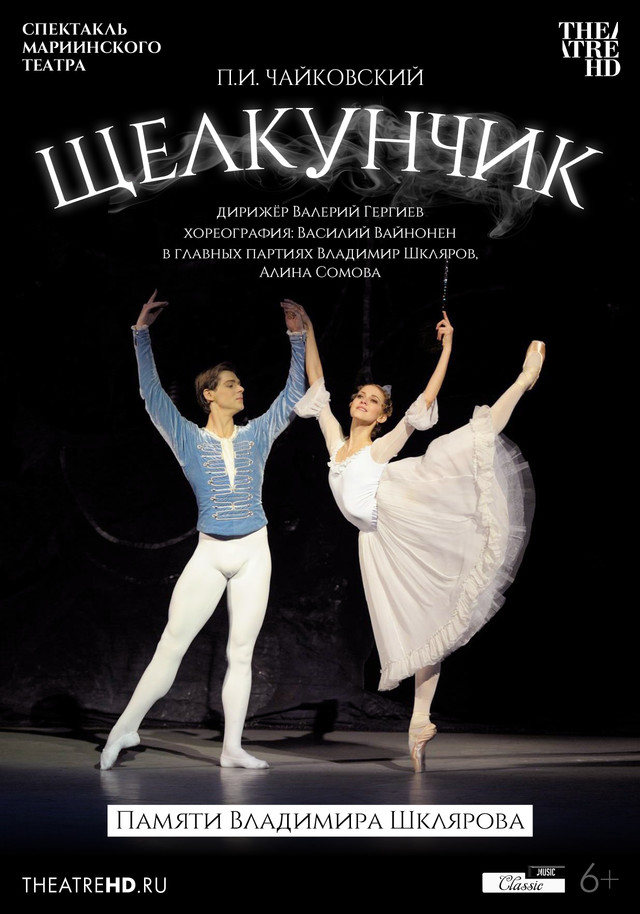
Mariinsky Theatre: The Nutcracker
Мариинский театр: Щелкунчик
Actors
Crew
Libretto
Marius Petipa
Choreography (1934)
Vasili Vainonen
Composed following the scene plan by Marius Petipa for a fairy-tale ballet féerie, Tchaikovsky's music was first performed in a production staged by Lev Ivanov in 1892. Luxuriously designed, that production answered the spirit of 19th century ballets – the integrity of the subject dramaturgy was not among the choreographer's primary tasks; the ballet master focussed his attention on the wealth of the dance text. "In the music of The Nutcracker there is not a single rhythm, not a single bar that could not flow into dance. On the stage everything seethes in an unceasingly gentle splash of the calmest of figures with explosions of rubicund and merry children's laughter, children's delights, raptures and momentary disappointments," as the critic Volynsky nostalgically recalled of Ivanov's production which was dropped from the repertoire once the country had become Soviet.
The avant-garde 1920s granted the Leningrad stage a new reading of Tchaikovsky's music. In the production staged by Fyodor Lopukhov there was no room for the serene harmony of classical dance. Acrobatic lifts, the splits and melodeclamation squeezed out the traditional variations and pas de deux. And yet the plastique experiments and the choreographer's stressing of the tragic basis of Tchaikovsky's score were met with caution by the critics. And already in 1934 the playbill announced a new Nutcracker – a production by Vasily Vainonen, a child of the new age that welcomed political correctness and the grounding of the dance firmly through the development of the fairy-tale plot. "Petipa's scene plan for The Nutcracker did not satisfy me because of the lack of a realistic interpretation of the first act, the intermitent intrigues and the gloss of sugariness (gingerbread houses, mice dressed in little cloaks etc)," wrote the choreographer and, rejecting imaginary characters, he created a production about a girl who dreamed of miracles. In Tchaikovsky's music the choreographer heard the harmony of sweet, caramel-like children's dreams and created a dance plot referring back to the traditions of 19th century ballet – with full classical ensembles in the Waltz of the Snowflakes and the Waltz of the Flowers, the pas de deux of the lead characters and the divertissement of the character dances in the Land of Sweets. Vainonen's Nutcracker was created using the established language of classical dance, the peripeteia of the plot in it are presented through dance and its choreographic variety was to prove a guarantee for its lengthy stage life. The production has not left the stage for over eighty years.
Today it is performed both by performers from the Mariinsky Theatre and students of the Vaganova Ballet Academy. Olga Makarova
The avant-garde 1920s granted the Leningrad stage a new reading of Tchaikovsky's music. In the production staged by Fyodor Lopukhov there was no room for the serene harmony of classical dance. Acrobatic lifts, the splits and melodeclamation squeezed out the traditional variations and pas de deux. And yet the plastique experiments and the choreographer's stressing of the tragic basis of Tchaikovsky's score were met with caution by the critics. And already in 1934 the playbill announced a new Nutcracker – a production by Vasily Vainonen, a child of the new age that welcomed political correctness and the grounding of the dance firmly through the development of the fairy-tale plot. "Petipa's scene plan for The Nutcracker did not satisfy me because of the lack of a realistic interpretation of the first act, the intermitent intrigues and the gloss of sugariness (gingerbread houses, mice dressed in little cloaks etc)," wrote the choreographer and, rejecting imaginary characters, he created a production about a girl who dreamed of miracles. In Tchaikovsky's music the choreographer heard the harmony of sweet, caramel-like children's dreams and created a dance plot referring back to the traditions of 19th century ballet – with full classical ensembles in the Waltz of the Snowflakes and the Waltz of the Flowers, the pas de deux of the lead characters and the divertissement of the character dances in the Land of Sweets. Vainonen's Nutcracker was created using the established language of classical dance, the peripeteia of the plot in it are presented through dance and its choreographic variety was to prove a guarantee for its lengthy stage life. The production has not left the stage for over eighty years.
Today it is performed both by performers from the Mariinsky Theatre and students of the Vaganova Ballet Academy. Olga Makarova



















